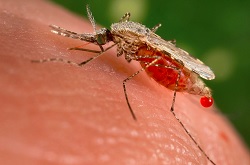 |
It's taken 30 years, but GlaxoSmithKline's ($GSK) experimental malaria vaccine is finally ready for regulatory review. Looking to bring the world's first shot for the mosquito-borne disease to market, the pharma giant said Thursday that it has submitted its candidate for approval.
The jab, dubbed RTS,S and intended for use mainly in sub-Saharan Africa, will undergo an assessment by the European Medicines Agency (EMA) in collaboration with the World Health Organization (WHO); if the EMA grants a positive opinion, a policy recommendation may follow by the end of 2015, WHO has indicated.
"This is a key moment in GSK's 30-year journey to develop RTS,S and brings us a step closer to making available the world's first vaccine that can help protect children in Africa from malaria," Sophie Biernaux, head of GSK's malaria franchise, said in a statement.
GSK based the submission on Phase III trials conducted at 13 research centers across Africa, including the continent's largest-ever clinical study. But that trial in particular suggested the vaccine may not be the panacea Glaxo was searching for: Among 15,000 children in 7 countries, the vaccine posted weaker-than-hoped-for prevention numbers and displayed waning immunity.
Still, as the British drugmaker noted, with no other vaccines out there, "an effective vaccine for use alongside other measures such as bednets and anti-malarial medicines would represent a advance in malaria control."
It's been a long road for Glaxo to this point. So far, the company has invested more than $350 million in development, and it expects to plow in another $260 million. That's not to mention the help it's gotten from the PATH Malaria Vaccine Initiative, which has chipped in with more than $200 million in grant money from the Bill & Melinda Gates Foundation.
And despite the so-far-untapped market and large patient pool--malaria claims more than 600,000 lives per year, with 90% of estimated deaths occurring in sub-Saharan Africa--Glaxo won't be recouping those investments through sales. The company has said it will sell the vaccine for 5% more than the cost of manufacturing, putting the profit margin back into malaria research.
- read the release
Special Report: The top 5 vaccine makers by 2013 revenue - GlaxoSmithKline